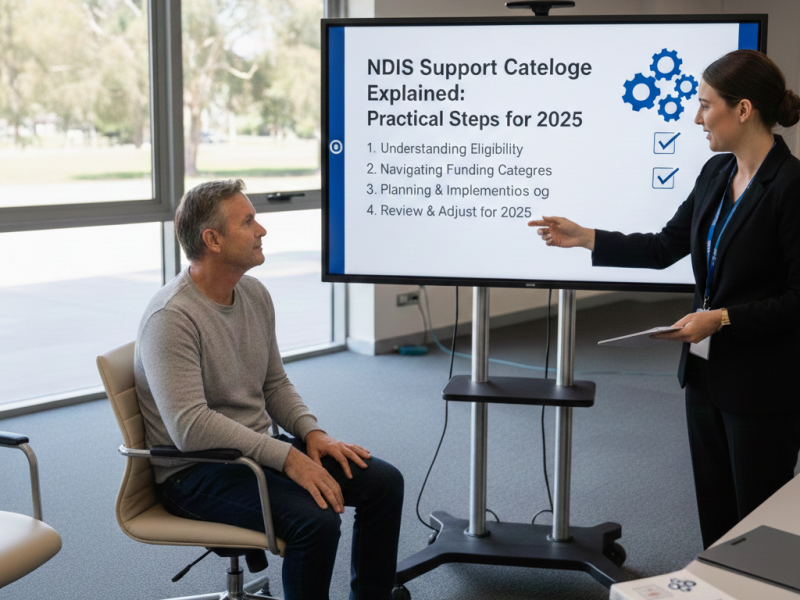Specialist Disability Accommodation (SDA) is a housing support within the National Disability Insurance Scheme (NDIS) for participants with extreme functional impairment or very high support needs. SDA refers to purpose-built or modified dwellings that enable people to live as independently as possible through features like step-free access, wider doorways and circulation spaces, structural reinforcements, and integrated assistive technology. SDA funding only relates to the bricks and mortar costs of the dwelling. Everyday support, such as personal care or Supported Independent Living, is funded separately in a participant’s NDIS plan.
Because SDA price limits are indexed and may be updated through formal NDIA determinations, it is important that participants, families, providers, and planners understand how SDA funding works and how it interacts with other payments such as Commonwealth Rent Assistance and the Disability Support Pension (DSP).
Want to Attract More NDIS Clients?
Get expert advice on how to market your services, connect with clients, and grow your practice.
SDA Price Calculator
The NDIA publishes SDA price limits and a calculator that estimates the SDA payment a provider can claim for an enrolled dwelling. The calculator factors in location, building type (for example, apartment, villa/duplex/townhouse, house), the SDA design category (Improved Liveability, Fully Accessible, Robust, High Physical Support), whether the dwelling is a new build or existing stock, and intended occupancy (single resident or shared). Entering these inputs produces the applicable annual SDA price limit and rent cap, which helps providers with revenue forecasting and helps participants compare options on a like-for-like basis.
The calculator is updated to reflect current price limits and indexation. Providers use it to model income and viability of SDA projects. Participants and families can use it to understand what is affordable under current rules, support budgeting, and avoid surprises. Clear inputs and transparent assumptions make it easier for everyone to make informed housing decisions.
Disability Support Pension
The Disability Support Pension (DSP) is an income support payment for people under Age Pension age who have a permanent physical, intellectual, or psychiatric impairment and, under the impairment tables, are assessed as unable to work 15 hours or more per week within the next two years. In most cases applicants need at least 20 points on a single impairment table, or they may need to meet Program of Support requirements if points are across multiple tables. DSP is means-tested and indexed to reflect changes in living costs.
SDA does not require a person to be on DSP; however, when a participant receives DSP, it is commonly used to meet their tenant contribution. Under the SDA rules, the participant’s contribution is capped by the Maximum Reasonable Rent Contribution (MRRC). The MRRC is typically up to 25% of the base DSP rate plus 100% of any Commonwealth Rent Assistance the person receives. The NDIA pays the remainder of the SDA price limit to the registered SDA provider after the dwelling is enrolled and a participant with SDA funding is a resident.
Key Principles and Provider Obligations
SDA delivery is governed by the NDIS SDA Rules and the SDA Design Standard. These frameworks ensure SDA funding is used appropriately, dwellings are safe and accessible, and participant rights are protected.
- Registration: Only NDIS Registered Providers approved to deliver SDA can claim SDA billing.
- Design categories: Every SDA dwelling must be certified by an accredited SDA assessor to one of the four categories — Improved Liveability, Fully Accessible, Robust, or High Physical Support — which set minimum design and performance features.
- Tenancy and choice: Participants must have fair tenancy arrangements and genuine choice and control about where, how, and with whom they live. SDA providers must keep housing separate from support provision to avoid conflicts of interest.
- Funding separation: SDA funding covers housing-related costs only. Support costs such as personal care, support workers, and nursing are funded under other parts of the NDIS plan.
- Dwelling enrolment: Before any SDA payments can be claimed, the dwelling must be enrolled with the NDIA, meet building and density requirements, and hold current certification to the relevant design category.
Non-compliance can lead to sanctions, including deregistration or loss of funding.
Referrals Start With Reputation – We’ll Help You Build Both
From networking tips to service refinement, we guide NDIS providers toward lasting impact.
Advantages of Specialist Disability Accommodation
SDA provides life-changing advantages for individuals with high support needs. Some benefits include:
- Independence: Designed environments enable individuals to live more independently, carry out daily tasks with less dependency on family or carers.
- Quality of Life: Adapted homes bring comfort, dignity, security, and the freedom to engage in community and social life more fully.
- Long-term Stability: SDA offers stable long-term housing, dispelling the stress of multiple relocations and creating a sense of home.
- Community Inclusion: SDA allows residents to be integrated into their neighbourhoods, enhancing their social ties.
- Cost Efficiency: Properly planned SDA can eliminate the necessity of repeated changes or intensive support, leading to improved outcomes and NDIS and participant value.
FAQs
1) How is SDA pricing determined?
SDA price limits are set by the NDIA and are indexed, typically on 1 July each year, with additional adjustments made through formal price determinations as needed. The official SDA Price Guide and the NDIA’s SDA Price Calculator are the tools used to determine applicable price limits for a given dwelling configuration and location.
2) Do SDA participants contribute to accommodation costs?
Yes. Participants generally pay a capped tenant contribution called the Maximum Reasonable Rent Contribution. This is usually up to 25% of the base DSP rate plus 100% of any Commonwealth Rent Assistance they receive. The NDIA pays the balance of the SDA price limit directly to the registered SDA provider once eligibility and enrolment requirements are met.
3) What are the essential rules for SDA providers?
Providers must be registered for SDA with the NDIS Quality and Safeguards Commission, ensure every dwelling is certified to the SDA Design Standard and enrolled with the NDIA, offer fair tenancy arrangements that protect participant choice and control, and keep housing funding separate from support funding. Ongoing compliance with building, safety, and reporting obligations is required to safeguard participant wellbeing.


